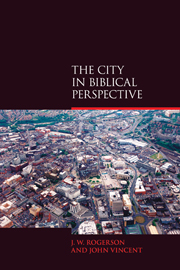Book contents
- Frontmatter
- Contents
- Preface
- Part 1 The city in the Old Testament
- Introduction
- Chapter 1 The Israelite City: History and Archaeology
- Chapter 2 The Israelite City: Biblical Perspectives
- Chapter 3 Making Connections
- Bibliography
- Part 2 The City in the New Testament
- Epilogue
- Bibliography
- Index of Biblical References
- Author Index
- Subject Index
Chapter 2 - The Israelite City: Biblical Perspectives
from Part 1 - The city in the Old Testament
- Frontmatter
- Contents
- Preface
- Part 1 The city in the Old Testament
- Introduction
- Chapter 1 The Israelite City: History and Archaeology
- Chapter 2 The Israelite City: Biblical Perspectives
- Chapter 3 Making Connections
- Bibliography
- Part 2 The City in the New Testament
- Epilogue
- Bibliography
- Index of Biblical References
- Author Index
- Subject Index
Summary
The Founding of the First City, Genesis 4:1–24.
The biblical writers were almost certainly aware of the fact that the city was not an Israelite invention. Israelites who travelled, whether as soldiers or exiles, saw that other nations had cities; cities that in some cases (e.g. Babylon) were far bigger and more magnificent than anything to be found in ancient Israel. The story of the founding of the first city in Genesis 4 has therefore to do with the city as a universal phenomenon. Yet while the opening chapters of Genesis describe the origins of a world and human culture of which the Israelites were only a small part, that description was framed in terms of the distinctive theological understanding of reality that the biblical writers embraced. Cain and Abel were not Israelites, and their quarrel, and the murder of Abel by his brother Cain have been compared with the story of Romulus and Remus (see Westermann, 1970: 390), and the founding of Rome. While the biblical story may well owe something to common folk tales about conflicts between brothers, in its present form it expresses Israelite religious convictions about the nature of cities. From this perspective, the city as a human institution is characterized not by brotherly co-operation, but by a rivalry that leads to bloodshed.
- Type
- Chapter
- Information
- The City in Biblical Perspective , pp. 21 - 41Publisher: Acumen PublishingPrint publication year: 2009



